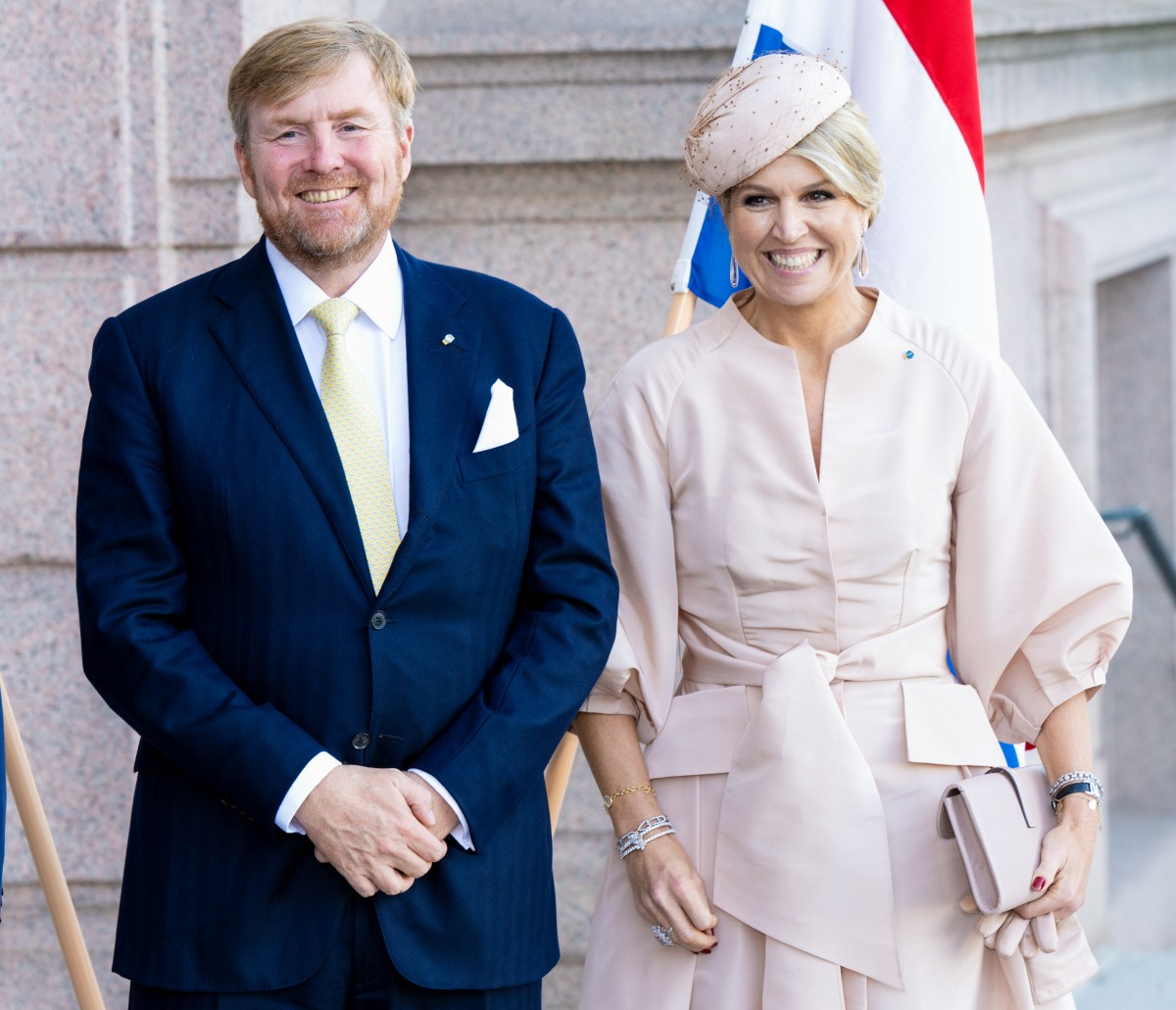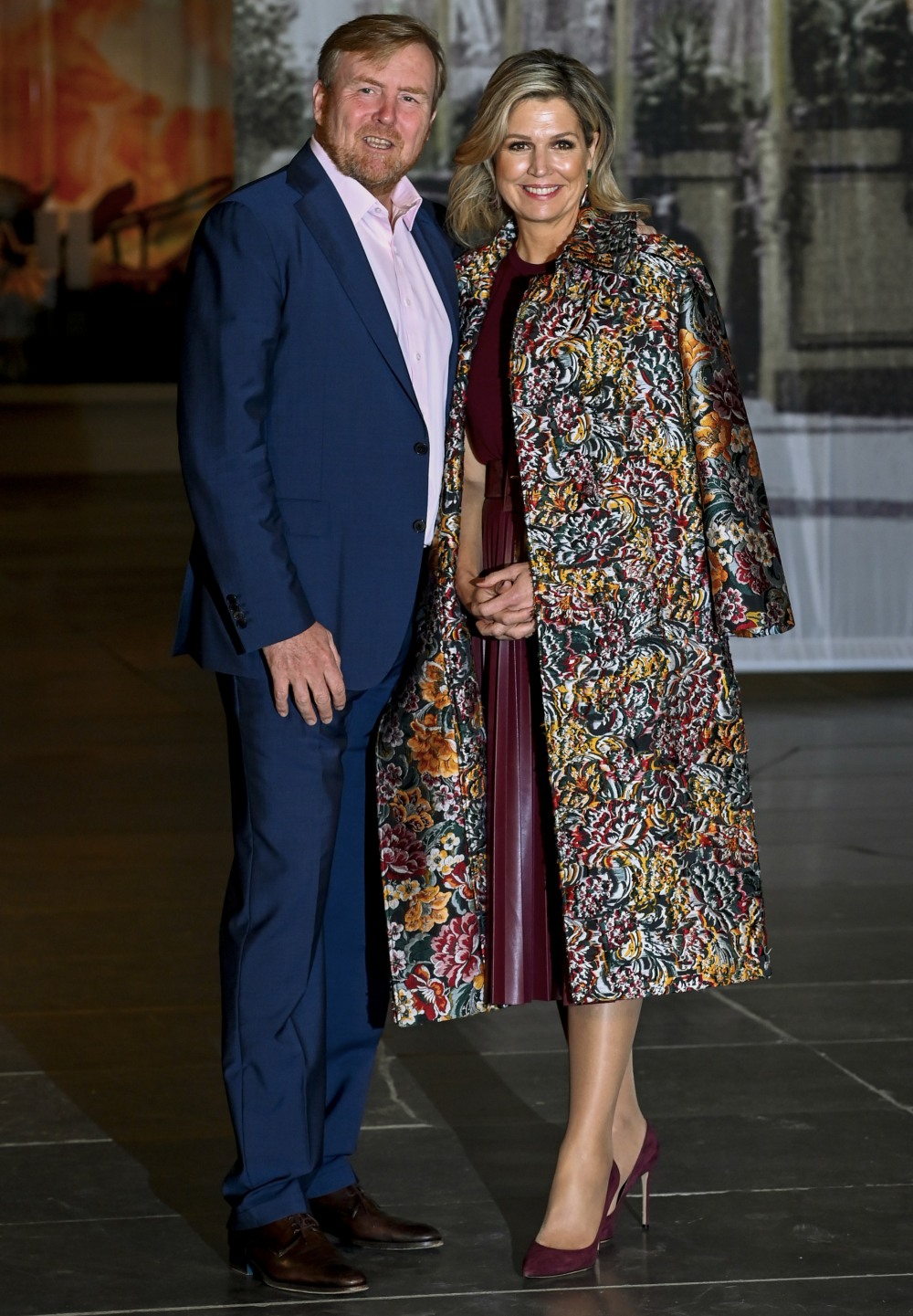In 2019, the New York Times started reporting on what would become The 1619 Project, a long-form journalistic and historical examination of American slavery. Racists and Republicans are still crying about it and then critical race theory became a “political issue” in the last couple of election cycles. While many, many Americans are still ignorant of our own American history of slavery, it’s worth discussing that many Europeans and Brits are equally ignorant of their countries’ histories in the slave trade and the colonialist plundering of African and Asian peoples. While Britain’s role in the transatlantic slave trade has been getting a lot of attention in recent years, don’t forget about the Netherlands. Now Dutch King Willem-Alexander has commissioned an independent research project which sounds a lot like the Dutch version of the 1619 Project.
King Willem-Alexander of the Netherlands has commissioned independent research into the role of the royal family in the country’s colonial past, the Dutch government’s information service (RVD) has announced. Three Dutch historians and a human rights expert will carry out the investigation, which is set to take three years and will span the period from the late 16th century until the “post-colonial” present, the RVD said, without elaborating on the details.
“Profound knowledge of the past is essential to understand historical facts and developments and to see their impact on human beings and communities as clearly and honestly as possible,” the king said in a statement.
The Dutch government later this month is set to apologise for its role in slavery during the nation’s colonial past, and is expected to devote about €200m ($210m) on a fund promoting awareness of the colonial power’s role in slavery and €27m to open a slavery museum. The announcement follows the recommendation last year by an advisory panel that the government acknowledge the 17th-19th century transatlantic slave trade amounted to crimes against humanity.
The Dutch central bank earlier this year apologised for its role in the slave trade and said it would fund projects to raise awareness of slavery and to mitigate the effects it still has on people. The Dutch played a major role in the global slave trade from the 17th century until the Netherlands abolished slavery late in the 19th century.
With the commemoration of the 150th anniversary of abolition next year, Surinamese advocacy groups and others are reinforcing their calls for reparations for the descendants of enslaved people. The Dutch West India Company operated ships estimated to have trafficked 600,000 people into slavery over centuries, according to Dutch state data. Enslaved people were violently forced to work under harsh and dehumanising conditions on plantations in Dutch overseas colonies in the Caribbean and South America.
Good. I’m glad King Willem-Alexander is doing this, although it doesn’t really seem like he has a choice? He’s getting credit for it, for sure, but it sounds like there are a lot of activists and historians already working on this and applying pressure for more to be done. I’ll be honest, I had no idea that the Dutch were involved to this extent. That’s why these history projects are so important. When will King Charles III? LOL, he won’t.
Also: Belgians are getting way too comfortable. The Belgian government and/or Belgian monarchy absolutely needs to commission one of these projects – the atrocities and genocide committed in the Congo under the rule of the Belgian monarchy need to be brought out to the light.
Photos courtesy of Avalon Red.
- STOCKHOLM, 11-10-2022, Riksdag Koning Willem Alexander en Koningin Maxima tijdens een staatsbezoek aan Zweden King Willem Alexander and Queen Maxima during a state visit to Sweden. Op de foto / On the,Image: 730023616, License: Rights-managed, Restrictions: (c) beschermde foto en verplichte volledige naamsvermelding tenzij anders voorafgaand overeengekomen of vermeld,geen gebruik zonder toestemming, alleen eenmalig gebruik, opslag in databank verboden, / Caption in file Info, Copyright marked, stricktly one t, Model Release: no, Credit line: Patrick van Emst / Avalon
- STOCKHOLM, 12-10-2022, Restaurant Operakällaren Koning Willem Alexander en Koningin Maxima tijdens een staatsbezoek aan Zweden King Willem Alexander and Queen Maxima during a state visit to Sweden. Op de foto / On the photo: WAndeling van het Grand Hotel naar Restaurant Operakällaren waar het Ontvangst Nederlandse Gemeenschap met passade en Kort woord door de ambassadeur en dankwoord door de Koning. Het eerste couplet van het Wilhelmus wordt gezongen,Image: 730024011, License: Rights-managed, Restrictions: (c) beschermde foto en verplichte volledige naamsvermelding tenzij anders voorafgaand overeengekomen of vermeld,geen gebruik zonder toestemming, alleen eenmalig gebruik, opslag in databank verboden, / Caption in file Info, Copyright marked, stricktly one t, Model Release: no, Credit line: Patrick van Emst / Avalon
- AMSTERDAM, 04-11-2022, Nieuwe Kerk Najaarfotosessie 2022 in in de Nieuwe Kerk in Amsterdam waar momenteel de tentoonstelling De eeuw van Juliana te bezoeken is. FOTO: Autumn photo session 2022 in the Nieuwe Kerk in Amsterdam, where the exhibition The century of Juliana can currently be visited. Op de foto / On the,Image: 735281719, License: Rights-managed, Restrictions: (c) beschermde foto en verplichte volledige naamsvermelding tenzij anders voorafgaand overeengekomen of vermeld,geen gebruik zonder toestemming, alleen eenmalig gebruik, opslag in databank verboden, / Caption in file Info, Copyright marked, stricktly one t, Model Release: no, Credit line: Patrick van Emst / Avalon
















The French and the Spanish need to do this too. I mean all the information is there. They just need to apologize and agree to pay reparations.
Yeah, and the Turks and Italians, as well as South America.
Also, we need more focus on modern day slavery, including that it still very much happens in Western countries too.
For Belgium, King Leopold’s Ghost thoroughly covered their atrocities but I agree, it should be shouted from rooftops.
That book gave me nightmares, I couldn’t finish it.
We lived in Belgium for three years and, at least then (2014-17) they were TOUCHY about the subject to say the least. There was some discussion in the last few years about statues of him but with the pandemic I don’t know if it resulted in any action.
I live in Belgium. The statues of Leopold II have been removed from most of the cities and given to museums
I worked in Congo for a while and let me tell you, you can still feel the mess caused by the Belgians in every corner of society.
Edit: And yes, King Leopold’s Ghost is an excellent account, but my god you have to be strong to read it
It is tough but King Leopolds Ghost is a must read.
Thank you for reminding about this book. I need to give it another read although, like you, I had a hard time reading it the first time.
Another good one is African Europeans by Olivetti Otele
@ Indica – I came here to say that. If you haven’t read King Leopold’s Ghost, please give it a try. It’s not a fast or easy read.
Thanks. Just put it on hold at my library
Same here. A friend had it in his library and gave it to me. Could not sleep, even when I got to the end. And not only should this commission revisit The Congo but Indonesia, lawd. “The Year of Living Dangerously,” didn’t tell anything about the wars ongoing there in the Sixties.
I have never heard of this book, just put a hold request on it from my library.
The Dutch owned a lot of the ships used to do this, and the Royal Dutch Trading Company is something everyone should know about. Netherlands has a lot to answer for, and not just about slavery. Our global climate crisis can be traced directly back to the Dutch Crown via Shell.
I knew the Netherlands were heavily involved in slavery, but I had no idea about the Belgians. I will give credit to the Dutch King, at least he’s coming right out and saying something, which is more than the British have (or let’s face it, will) ever done.
The Belgians were…monsters. Horrific, absolute monsters. Each European nation needs to take a hard look at itself and talk reconciliation, reparations, education. Much like we need to continue to do (and get what better at) in Canada and the US. Much of the world suffers generational trauma thanks to white people, their greed and their monarchies.
Not speaking for everyone in the UK but as a teacher of the UK History curriculum I would like to mention that slavery and colonialism are taught in a critical way, not a “hurrah for the British Empire way”. I don’t think it’s fair to claim that Brits are ignorant of it.
2 people on the H&M documentary both said that they were never taught much about the British role in slavery only that Britain abolished it before other countries. It appears that the curriculum has changed but it does seem that many older Brits weren’t even aware that reparations were still being paid to slave owners until 2015.
Reparations were given to slave owners in Suriname as well. I didn’t learn about that when I first came to Holland, and had been unaware of it elsewhere. To put this into perspective for my parents’ generation: it would be considered massively twisted to pay the nazis and other fascists for loss of income because the allies freed Europe and Asia, no?
@ML Newly freed people were even forced to continue to work for ten years, in addition to the compensation the slave holders were given. Activist Perez Jong Loy (now sadly deceased) tried for years to get the Dutch government to acknowledge the year 1873 as the true year slavery was abolished in The Netherlands.
I’m a UK teacher and the teaching of the curriculum is vague and it’s really down to the teacher and the school. Mostly? It is not taught ‘correctly’ and thoroughly… maybe some teach it like it’s not a hurrah but it is taught in that case as an abstract thing that happened and not deeply to show how much of what happened still echos today in all aspects of society.
I’m really pleased to hear this, it’s been a long time since I was at school but it wasn’t mentioned at all and I studied history to A’ level . I think as the generations come through (my son is 10 and always asking questions along with my trying to educate him (and myself)) things will change. I can only hope they do.
Well done to King Wilhelm! This is what leading from the front looks like.
The Royal Family should have been brave enough years ago to examine links to the slave trade. They have so much material which could be used for exhibitions and documentaries that we could all learn from. Meghan would be the best person to be part of such a project.
The RF should follow the lead of institutions such as the National Trust. I wrote to Buckingham Palace about this around the time of Black Lives Matter and l did not even get a reply.
I visited Curacao and this article is a great glimpse into ongoing dynamics around Dutch power (think Puerto Rico relationship to U.S. – all the benefit, none of the obligation). There is more than one way to keep people in chains. https://theroyaltourblog.com/2021/10/21/curacao-and-the-dutch-slave-trade/
This is a brilliant link, Nutella Toast, thanks!
I don’t know if the film is available in English, but I recommend Bulado. It’s a rare film dealing with Antillean culture
It’s been a process over the past few years in the Netherlands. They changed the school curriculum to include the enslaved—prior to this, the colonies were taught as if they were a wonderful part of Dutch history. The Dutch have a ways to go, but I applaud them for this start. Also, Willem-Alexander commissioned this deep-dive into his family’s past before being asked about it and it is (in theory) being done by independently by the U of Leiden.
The negative aspects of Dutch colonialism have been on the national curriculum since 1997. There are a lot of people speaking about this who still use their own education as a reference point for how colonialism has been taught, but there have been a lot of changes over the years and it’s not fair to state that before very recently colonialism was glorified in history education.
True. I was taught about colonialism a little before 1997 and it was already a negative thing, though probably less extensively covered than now.
It was also treated as a negative thing in Dutch language lessons as we read texts about colonialism and activism against it.
Wilma and Flowerlake, I emigrated to the Netherlands about 20 years ago. During my inburgeringscursus, we had a LOT of why the Dutch East India Company (VOC) was glorious, great mentality, good for the nation. We were taught diddly squat about the economic slavery of Indonesia (which upset the Indonesians in my class, the mass genocide, the mistreatment of the Molukkans…) nor anything about the Dutch West India Company (WOC). I recently learned about the slave owners being paid for ending slaverY in Suriname. When I got here, I swear most people had no issue with black face makeup for their kids with Sinterklaas. No issues with the Golden Coach for Prince’s Day. Had no idea that the gilt-trimmed town halls were paid for by the colonies. And my friends’ children did not learn any of that during 2001-2014 in school. The slavery exhibition at the Rijksmuseum in A’dam as told by art a couple years ago was groundbreaking. It was absolutely NOT part of the general curriculum here not general knowledge.
As an actual history teacher in The NetherlandsI can tell you that it is and has been part of the curriculum for about 25 years. I don’t know about the inburgeringscursus, but it has been taught in schools on all levels.
I’m definitely not trying to defend the blackface tradition you’re referencing here as I think that has always been despicable, but I think that the biggest issues are with the generations that had the old school curriculum. Newer generations definitely had this taught. My 15 year olds started third grade this year with 9 weeks of colonial history in Indonesia. My 13-14 years olds started a few weeks ago with the beginnings of the slave trade and will continue this thread throughout the year and end in June with modern imperialism. And they have done this for as long as I have been a history teacher (16 years now).
Also have to add that the inburgeringscursus is absolute crap. The cultural and history stuff I have seen in there is useless, condescending and not helpful at all.
As I said, I was taught about it in the 1990s in two different subjects in high school and not as a positive thing.
The Republic of Haiti, currently a failed state, spend over 100 years paying reparations to France and the former slaveholders, the cost of Haiti’s independence. France needs to acknowledge and return the money.
Athena – 💯 The United States also occupied Haiti for decades and played a large role in Haiti becoming a failed state.
There is an exhibition of Colonialism in Amsterdam now that goes quite indepth. Took some friends there.
Again, this is the problem with royalty. It’s an institution founded on imperialism and the ‘right of blood.’ It’s rotten at its core. There are other institutions founded in shameful ways, but they can adapt with the times (universities founded by slave owners, etc.) and the heart of them isn’t something as disgusting as ‘bow and scrape to me due to my blood.’
IDK, I think a lot of royals are pretty decent (excluding the BRF) but as time goes on I have less patience for this bullsh*t. I just think it’s ridiculous that such an institution exists in this day and age,
My son has been in AP and advanced history classes for the past 5 years here in the US. They are finally teaching an honest account of US history, at least in the advanced classes. Meanwhile, parents stand up at Bd of Ed meetings to complain that the curriculum is anti-American and anti -white. Yes, they do. People are still in denial.
While this sounds like a step in the right direction, I’m more interested in knowing what they intend to do with the findings. Hopefully, it’s not more words expressing “sorrow and regret” with nothing actionable behind them.
I think the king is really ready to go further than the government is willing to go and this is one of the few things he can do to put pressure on that process. The Dutch government is currently embroiled in a heated discussion on the apologies they mean to offer for slavery. They intend to send some of our ministers to Surinam and the Antilles to apologize on behalf of the Dutch government. The catch is that one of them is black and of Surinam descent. Plus, there has been no discussion with Surinam or the Antilles on how they would like these apologies to happen. I think Willem-Alexander is very willing to go and apologize, but he has to be asked for this by the government and can’t make that call on his own.
This is a really important step and I’m glad to see the Netherlands and Willem-Alexander doing this.
We learn about slavery here in the US but I remember learning very little about Reconstruction and the impact that had on former slaves in the south. Also, I think in the US there is a tendency to talk about slavery and segregation etc as something that other states did, not you. I’m from a mid-atlantic state and we were always taught “the south had slaves, how awful.” Well……we had slaves too, I mean the book Kindred is based in Maryland.
now that my kids are going through the school system I am interested to see how much they learn about slavery and its lasting effects. I’m also interested in comparing what they learn (in a public school in a purple county, our area is pretty blue but the rest of the county is not) to what my nieces and nephew learn, who go to $$ private schools in very red areas.
It should not be so polarizing and politicized and yet here we are.
I was actually taught a lot about slavery and its aftermath here in the US, but that might have something to do with where I went to school. My home town in New Jersey is diverse, and its public school system was fully integrated in the 1960s. Slavery and the Civil Rights movement were both part of our curriculum. I also majored in American Studies in college and took a lot of courses in Southern history and literature, so I learned a great deal about slavery as an institution in the US, as well as about Reconstruction and its failure.
But I can’t speak to the experience of others. Public school curriculums are largely under the control of states and local school boards. My sister went to private school and I know her program was less focused on it than mine was, as well.
I’m glad Willem is doing this. I don’t know much about the Dutch involvement in the slave trade around the globe. They had a large colonial presence in what is now the US at one point. New York was called New Amsterdam in 17th century, I believe. I don’t remember when it changed hands.
Definitely a step in the right direction & I totally agree about Belgium. I hope other countries & royal families start to feel pressure to engage with the harm they’ve caused & benefited from.
Those who forget their history are doomed to repeat it. Isn’t that the saying?
People need to be taught empathy + history.
It’s good that people are willing to learn but, IMO, work to help people now.
And statues of dead “hero or royalty” is a waste of money.
Feed people, safe affordable housing, health care so many in need.
At some point next year the Dutch Royal Family will be making a trip to the Caribbean islands that are still part of the Netherlands to introduce Princess Amalia. It will be very interesting to see what that tour looks like and what the local reaction will be. Given that it will be the heir to the thrones first official visit how they acknowledge or ignore the past will be very indicative
As someone from Aruba and a descendant of both slaveowners and slaves I have a whole host of thoughts on the apologies and the investigation. It seems more something that is done for the Netherlands government than for the islands themselves….
I hope that this will result to be something positive for the islands.
We we in Amsterdam this year and a Text about the topic of slavery was added to many pictures in the Rijksmuseeum, explaining how the riches that comissioned the art were gained by slavery and colonialism.
I appreciated, how the indirect links were highlighted.
We defininitly need this conversation here in Germany as well.
Here history starts and ends with the Holocaust and people too often seem to think, taking resposibilitie for on genocide wipes out the crimes Germany committed bevor the third reich. Even worse, attempts at a glorification of the past bevor WW1.
1) vThe Dutch were THE W.O.R.S.T. during the slave trade. If you go to the African American Museum in DC they have depictions of how the French, British etc would fill ships to the brim with about 200-300 enslaved peoples, the Dutch will fill their ships (same size) with 500+ peoples. They would stack them horizontally on top of each other for a 3 week transatlantic trip. Those at the bottom would die and stay there until the ship hit the US or Caribbean.
2) Someone upstream mentioned Shell oil companies. Yep look at the damage they did in Nigeria. It was so bad that a Dutch human rights organization SUED Shell in Netherlands for what they did in Nigeria.
3) watching PBS documentary one night. The Dutch not only trafficked humans out of Africa, but also WITHIN Africa. They kidnapped kids from Madagascar and took them to South Africa. The doc showed the actual picture of the ship filled to the brim with 200+ middle school aged students. I burst into tears. This was 1860s or 1880s, i don’t remember. In South Africa, those from Madagascar were given the surname of the day they arrived. I wonder if S. Africans with that surname know they’re from Madagascar.
4) Oh you know…Apartheid
They did a great job ushering the age of apartheid too, from which crappy a-holes like Elon Musk still benefit. And DeBeers and it’s diamond mines, well, the Dutch have a lot to give back to make African peoples across the continent and elsewhere whole.
I apologize if this is too off-topic, but the horrors of the slave trade make me think that people don’t realize just *how* insulting that Hussey woman was being when she told Fulani “you must know where in Africa your people came from.” No, they don’t always know where in Africa their people came from, thanks to the slave trade — and thank you for rubbing it in.
I took a university world history class in the 2000s. I had gone to a white minority HS, so I I had a pretty good knowledge of the US enslavement. However, looking at the charts on the global slave trade was mind blowing. The US received maybe 10% of trafficked enslaved people. Also, that most of the Caribbean colonies had many multiples of enslaved people arriving compared to enslaved population. People were just being slaughtered? genocided? and replaced with more people. There isn’t even a word. The US had its own horror, but we can’t let that be the sole narrative of the global slave trade. It lets way too many people off the hook.
Joseph Conrad- Heart of Darkness
Can def believe it’s the Netherlands that’s having a convo around and about their colonial history before Belgium,. Yet like others have said, it’s not worth applauding their way too late response to their own dark history. It’s better to know it’s bad and own it, than to deny it though (which is still a thing in Belgium) every convo that starts with how badly Belgium has fucked over Congo and its people to even this day, there is always one person that will say that Belgium has done good things during their colonisation of Congo and has done enough in far of reparations…
Look, I believe that it’s a positive move to look into the Netherlands’ racist past. King W-A is acknowledging that his family got wealthy due to colonialism and that is huge. Various Dutch municipalities and companies have also acknowledged their involvement. Without knowing this, it’s really easy for a country whose enslaved-based labor was far, far away from its inhabitants to ignore what happened.
I had an in-depth conversation with my kids last night. Only my youngest had any education about slavery (via the Da Vinci program) during elementary school, and she’s now in first grade (high school) and it hasn’t come up yet. I have two other kids; yes, they got a history of “what happened and it was bad,” but next to no cultural context.
Full disclosure: I was horrified when my eldest started school at age 4. Due to our family background, my first conversations were due to a birthday song, “Hanki Panki Shanghai” (spelling?). I could not get the flipping school to either understand or stop singing it at every birthday. I was horrified by the Zwarte Pieten (Black Petes). And the school wanted me to stop speaking English to my child and assimilate. The other parents were pissed off because they told their children that Santa didn’t exist, and I told my kid that Santa and Sinterklaas were equally real. After the first year, we pulled our child out of that school.
The Dutch school system is better than I had in the US when it comes to languages, world and European history in general, self-sufficiency and involving my kids in their own education. That said I had Black history and women’s history taught by a black teacher. My kids attend VWO (6-year high school) and HAVO (5-year high school). Almost all of their classmates and teachers are white. My youngest just graduated elementary school this summer: next to none of the non-Western European background kids are attending VWO or HAVO. This is a problem.
Spam again?
This is so close to home. The first time I read it I was in tears.
I was born in Demerara, moved to Trinidad for a while and eventually lived in this very region.
There was a book titled “Rivers of Blood”
written by Marjoleine Kars.
It was about the Berbice Slave Rebellion, the longer lasting revolt, save for Haiti.
That was in 1763, Cuffy the leader originally from West Africa, led the rebellion against the Dutch.
The revolt lasted for nearly a year. Wikipedia tells another story, hopefully the Netherlands will use its records to face the truth.
Although we revered Cuffy, our principled hero, we were taught in school not to aspire to heroism, but to instead create a fair and impartial society
Heroism, as taught, led to death.
Eventually, the British formed a colony as a result of the spoils of war.
They moved plantation owners from Barbados to occupy this territory, among them an ancestor and his son.
To facilitate the move, his wife and daughters were sold, and moved to the southern US.
The enslaved from Barbados were originally from the Gold Coast, likewise the people of Dutch Berbice.
We sing this folk song, beginning with “Nation ah wa yo…..
My grandfather told me the story about the move, the death of the ancestor from “wokin’ out he soulcase’ and the son who became emancipated.
This story liberated me at age seven. I discovered the details through books.
We had to study the Mercantile Wars, the buccaneers; brutality and resistance in our hemisphere.
No descriptors, just the facts. That was enough.
Grandfather’s mother was the only child of her parents. She died at the age of 34.
We are her descendants, managed in that short time to occupy all types of careers excluding Prime Minister, that would also be a reality some day.
Imagine what would have happened if they, our ancestors were allowed to fulfil their potential.
Ms. Mary Cummings